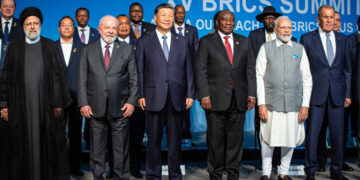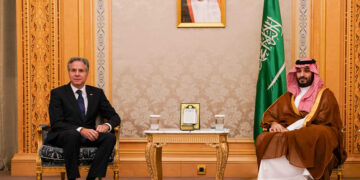Samha Saeed Alghamdi was one of three Saudi Human Rights Commission (HRC) members who visited prominent women's rights activist Loujain Alhathloul in prison and received from Alhathloul reports of torture, including sexual assault, electrocution, death threats and other forms of mistreatment. Not only did she not investigate Alhathloul's claims of torture, a gross human rights violations, she also did nothing to protect Alhathloul from further mistreatment.
"It is shameful to turn your back on a vulnerable person in a time of need," said Sevag Kechichian, Gulf Researcher at Dawn. "And it is grotesque to do that to a torture victim, when your job is to protect her and promote human rights."
According to Alhathloul's family and a memorandum they submitted to a Saudi court, on or about November 26, 2018, a committee from the Saudi governmental Human Rights Commission visited Alhathloul in the State Security Presidency's Dhahban Prison to inquire about her allegations of torture, sexual harassment, electrocution, and mistreatment. Saudi security forces had arrested Alhathloul and other women's rights activists on May 15, 2018, because of their activism against the ban on women driving and advocacy for protections against domestic violence. The visiting committee included Alghamdi, Wafa Alsaleh and Amal al-Moallimi.
As reported by her family and in court records, Alhathloul told the three members of the Commission about the incidents of mistreatment, torture, sexual harassment, electrocution, and threats of rape she endured in prison. Alhtathoul asked them, "Will you be able to protect me?"
According to her family, the Commission members said they could not help her. There is no indication that Alghamdi or her colleagues took any action regarding Alhathloul's complaint. In its annual reports, the Commission mentioned having received complaints about torture and mistreatment but did not list any action taken. Indeed, months later, a representative of the Human Rights Commission spoke to the Saudi media outlet Okaz, denying reports of torture and mistreatment in Saudi prisons.
The refusal of Alghamdi and her colleagues to investigate Alhathloul's complaint and take appropriate action violated their obligation under the Saudi Statute governing the Commission, to "receive and verify complaints related to human rights and take legal measures pertaining to them." Indeed, in its 2019 annual report, the Commission wrote that its members "monitored the procedures and trial to make sure that individuals got their rights according to the law."
"People like Alghamdi need to take their role as human rights advocates more seriously," said Kechichian. "She not only failed Loujain, she also tainted the name of an honorable profession where real human rights defenders risk their lives to save others every day."
Alghamdi was appointed to the Saudi Human Rights Commission in August 2016. She graduated in 1983 from King Saud University and obtained a Master's in Social Work from the same institution. Prior to her position on the HRC, she was an adviser for Social Care and Family to the Undersecretary of the Saudi Ministry of Social Affairs.
See cases: Loujain Alhathloul
DAWN contacted Samha Saeed Alghamdi on December 9, 2020 to request a response, but no response was received by the time of publication.
Watch the video on Samha Alghamdi here:
Media error: Format(s) not supported or source(s) not found
Download File: https://dawnmena.org/wp-content/uploads/2021/09/Video-of-Samha-Alghamdi-en.mp4?_=1***
Tweet to Samha Alghamdi here and to the Saudi Human Rights Commission here. Tell them to stop covering up torture in Saudi prisons.
About DAWN's culprit gallery:
Tyrants need enablers who will implement their oppressive practices, even if it means abusing their fellow citizens. These agents often mask their complicity in the guise of professionals exercising their duties in offices, courtrooms, police stations, and interrogation rooms.
DAWN seeks to disclose the identity of the state agents who enable repression and, to make them recognizable at home and abroad. These individuals, whom DAWN calls "culprits," bear administrative, civil, moral, legal, and/or political responsibility for human rights and international humanitarian law violations.







































